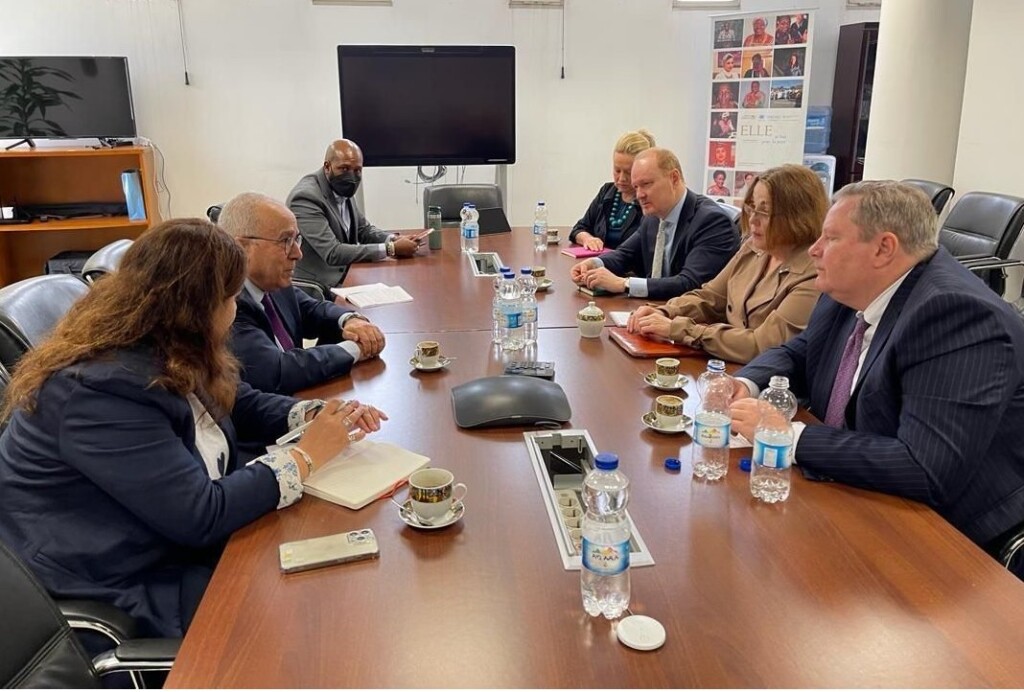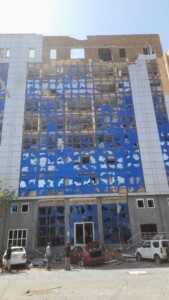US Ambassador to Sudan: ‘Contradictory signals from the army hinder aid access’

John Godfrey, Molly Phee, and Mike Hammer (right) meeting the UN Personal Envoy of the Secretary-General to Sudan (centre left), on February 13 (Photo: @AsstSecStateAF via X)
The US Ambassador to Sudan, John Godfrey, provided reporters with a comprehensive briefing on American initiatives aimed at resolving the conflict in Sudan. He highlighted the significant hurdles encountered in facilitating humanitarian aid and fostering dialogue with the warring parties.
In an online special briefing yesterday, United States ambassador to Khartoum, John Godfrey, accompanied by the US Assistant Secretary of State for African Affairs Molly Phee, and Special Envoy to the Horn of Africa Mike Hammer, reiterated Washington’s readiness to engage in peace talks on Sudan.
“We do think there needs to be participation by the external actors who have leverage to bring to bear against both parties, so that we can find a negotiated exit to this terrible conflict”, the US ambassador said.
Other US efforts to put pressure on the warring parties include economic sanctions. “Since the beginning of the conflict, we’ve sanctioned 14 individuals and entities to deny the belligerents the means to prosecute the war, to reduce and deter atrocities and other human rights violations, as well as to ensure that there’s a post-conflict civilian government.
“Other measures have included the Secretary of State issuing an atrocities determination on December 6 that indicated that SAF has committed war crimes and that the RSF has committed war crimes, crimes against humanity, and ethnic cleansing.”
The ambassador further expressed deep concern about the external support provided to the warring parties – the Sudanese Armed Forces (SAF) and the paramilitary Rapid Support Forces (RSF), particularly from Iran, after the two countries restored ties in February.
“We have urged external actors to refrain from providing materiel support to the two belligerent parties, which has two principle consequences: one, it prolongs the fighting, extends the war; it also reduces the prospects for finding a negotiated exit from the conflict.”
As reported by Dabanga last December, 10 members of the US Congress sent a letter to Sheikh Abdullah bin Zayed Al Nahyan, foreign affairs minister of the United Arab Emirates (UAE), urging him to end his country’s support to the RSF.
Humanitarian aid
Regarding humanitarian access, Godfrey gave a reminder that “under the Jeddah Declaration of Commitment to Protect the Sudanese Civilians, both SAF and RSF signed on to allow and facilitate the rapid and unimpeded passage of humanitarian relief”, adding that “very candidly, that has not happened”.
The ambassador pointed to “confusing signals” from the SAF on allowing aid access to areas under RSF control, which has prevented the flow of aid “in a rapid and unimpeded way that both sides have committed to” since the start of the war last April.
“In addition to that, there were a series of measures that they agreed to, confidence-building measures, in the second round of Jeddah talks, that included participation in a humanitarian forum under the auspices of UN OCHA [the United Nations office for Coordination of Humanitarian Affairs], as well as specific steps to facilitate humanitarian assistance corridors and distribution of aid inside Khartoum itself. Those have not been met either.”
Another hurdle is the “persistent issue of so-called bureaucratic impediments, which includes things like visas for humanitarian assistance workers, travel permits, and inspection of humanitarian cargoes”.
OCHA reported back in November that several hurdles were facing their international staff in Sudan, including about 200 pending visa applications , severely impeding their ability to provide adequate aid to more than 25 million Sudanese in need.
‘Crime against humanity’
In his address to members of the 19th Infantry Division in El Debba in Northern State on February 10, SAF Commander and Sovereignty Council President Abdelfattah El Burhan said that provision of aid “will only take place after this war has stopped and the criminal rebels [RSF] have been defeated”.
According to Motasim Ali, international law expert and researcher at the American University in Washington, these statements rejecting the entry of humanitarian aid into Sudan are a violation of international humanitarian law and human rights law.
Expressing regret that the armed conflict between the SAF and RSF has reached this point, he told Dabanga last week that “civilians in areas under the control of any of both warring parties have the right to protection and the delivery of aid, which means that denying them that right is considered a crime against humanity.”











 and then
and then